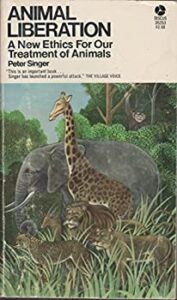The Book Corner:
Animal Liberation: A New Ethics for Our Treatment of Animals
by Peter Singer
I clearly remember the moment I laid eyes on the book that would forever change my life. The year was 1977. I was in a bookstore in Greenwich Village, NY, appropriately looking for a book on the care of felines as I was working in the cat department of an animal shelter.
Instead, I stumbled upon a small paperback titled Animal Liberation: A New Ethics for Our Treatment of Animals. The word ethics caught my attention. I read the first sentence. “This book is about the tyranny of humans over non-human animals.” My heart skipped a beat.
 I skimmed the table of contents …Down on the Factory Farm …Tools for Research …Man’s Dominion, etc. It was magical. The thoughts I held about animals had been validated because they were there in black and white. I carried my little treasure to the cashier and forgot all about my search for a cat book!
I skimmed the table of contents …Down on the Factory Farm …Tools for Research …Man’s Dominion, etc. It was magical. The thoughts I held about animals had been validated because they were there in black and white. I carried my little treasure to the cashier and forgot all about my search for a cat book!
Published in 1975 by Peter Singer, an Australian philosopher, Animal Liberation would fast become known as the bible of the animal rights movement. Singer documents the suffering animals endure on factory farms and in research laboratories. If you care about animals, it’s not easy to read. The numbers of animals brutally raised on factory farms is in the billions and the experiments that animals are used in are heinous and often for no result that can be extrapolated to humans.
But this is not a book written to expose these practices alone. What makes the book readable is the ethical arguments he so brilliantly gives the reader to ponder. “This tyranny has caused and today is still causing an amount of pain that can only be compared with that which resulted from the centuries of tyranny by white humans over black humans. This struggle is as important as any of the moral and social issues that have been fought over in recent years.”
He is adamant that the reader understands that he or she does not have to love animals to support the basic moral principles he puts forth. He even states he did not “love” animals. He simply wants them treated as independent sentient beings — and not as a means to human ends.
Forty-six years have passed, and since then many books have followed a similar narrative making the case for animal rights. But Peter Singer’s Animal Liberation launched a movement and put animal rights on the global map. Everyone ought to read it and more importantly pass it on!
Lia Albo
New York State Humane Association Humane Review, Vol.XXXVIII, Fall 2021.